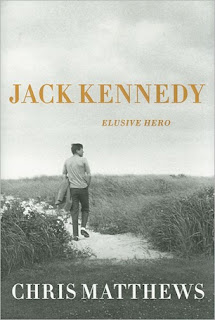JACK KENNEDY, ELUSIVE HERO: MAGIC, PART I
Knoxville, Tennessee (37920) Today JFK+50 reports on the 1st half of Chapter 7 of Chris Matthews' new book, Jack Kennedy, Elusive Hero, published by Simon & Schuster.
The title of Chapter 7 is MAGIC.
Chris begins in this chapter detailing a disagreement between Joe Kennedy, Sr, Jack & secretary Mary Davis.
Mary had been given the job of choosing JFK's new senatorial staff "based on the standard (monetary) allocation from the Senate."
Mary's assignment of the pay levels for this staff was not satisfactory with Joe Sr., or for that matter, his son.
Chris writes that while Mary was looking at the "day to day" needs of the office, both Jack & Joe, Sr. were more interested in "building a wider constituency (that) extended far beyond Massachusetts."
Jack's attempt to win Mary over to his view were unsuccessful & Mary went to work for someone else.
Chris argues that this episode illustrates that while Jack was his own man when it came to "policy, politics & personal relationships," when it came to the subject of money, Jack was "his father's son."
Chris writes that George Smathers was not too complimentary of Jack's senate office after Mary Davis left. Smathers described it as in "disarray (with no) organization."
Smathers went on to say that he "never did feel that (Jack) was a well-organized man, either in his personal life...or in....running an office. If the work got done, that was all that....concerned him."
Chris tells us that just as JFK had seen the House of Representatives as a stepping stone to the Senate, so he saw the Senate as a stepping stone to the Presidency.
And who should be in the office right across the hall from JFK? Who else?
Richard Nixon.
JFK in Senate Office
Photo by John Vachon
Library of Congress/JFK Library Photo
Chris tells us that the new senator gave a 5 minute interview to a 24 year old Nebraska lawyer named Ted Sorensen.
Ted Reardon, according to Mr. Matthews, said that Jack was able to have guys around him, like Sorensen, not as "buddies" but "to get what he needed from them."
Chris describes Ted Sorensen as the "ideal Kennedy staffer" & writes that JFK later would say that he "never had anyone who could write for (him) until Ted came along."
I found it most heartwarming that Ted himself wrote of JFK:
"He was much the same man in private as he was in public.....a good & decent man (who) cared about....those around him."
Ted Sorensen
JFK Speechwriter
Photo by Abbie Rowe, NPS
JFK Library Photo

























